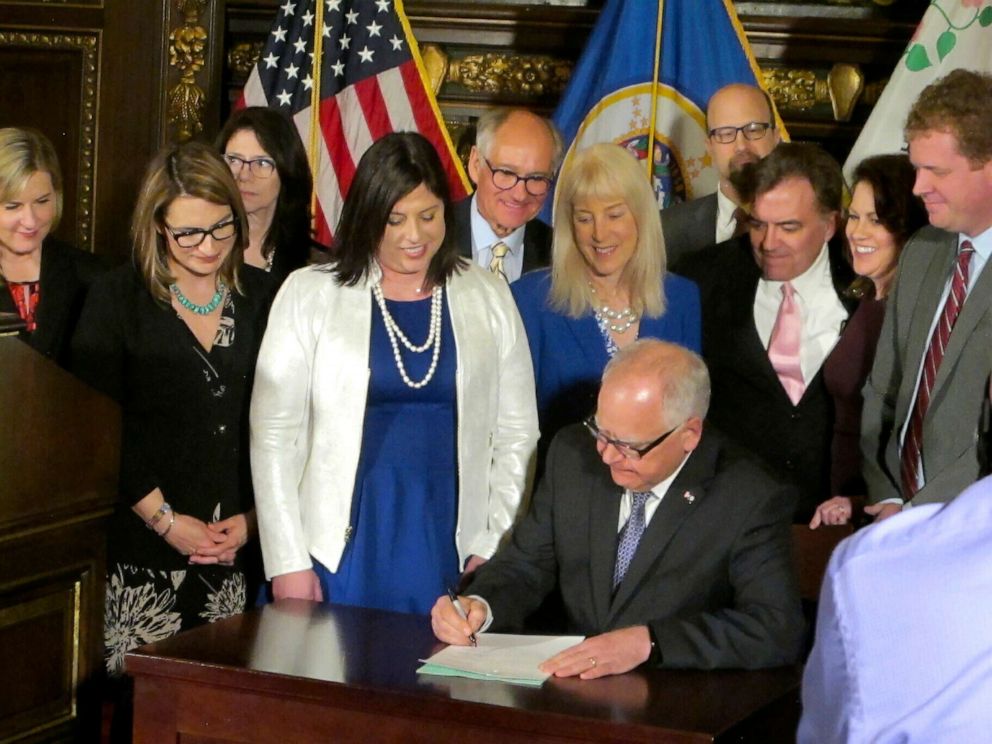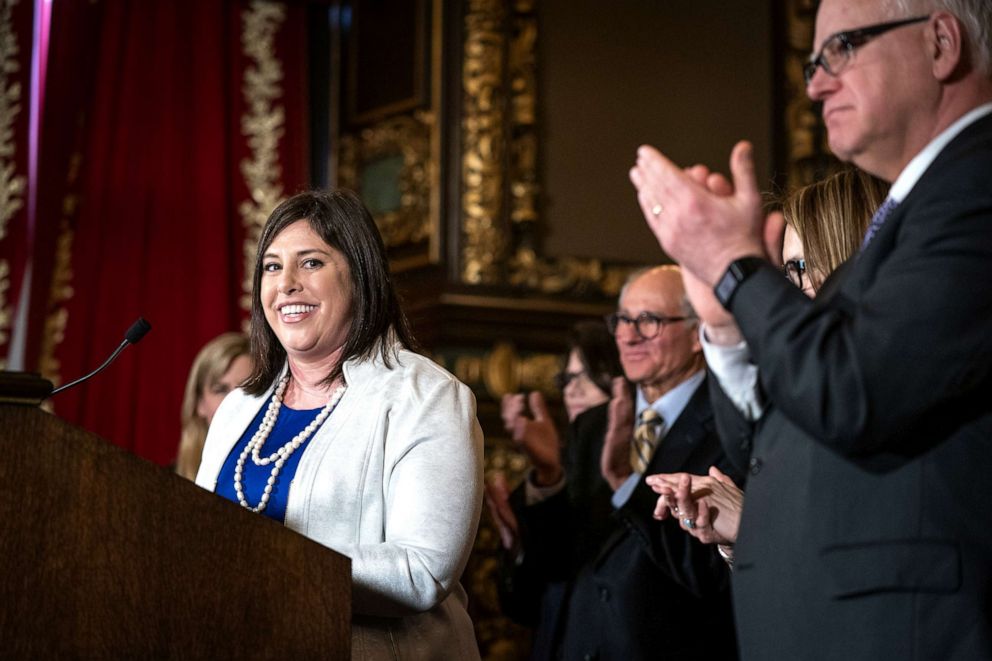Minnesota's repeal of marital rape exemptions highlights existing legal loopholes
The legal fight was spearheaded by a woman who was a victim seeking justice.
The governor of Minnesota closed a legal loophole this week in the state’s marital rape law -- just one of what advocates describe as scores of legal loopholes still permeating state criminal justice laws from coast to coast.
Marital rape laws have been in place in all 50 states for more than a quarter century, but a number of those states -- like Minnesota -- have had exemptions in place which specified certain circumstances in which what would typically be considered rape if it happened between strangers, is not considered a crime between a married or existing couple.
Aequitas, a national non-profit that studies prosecution practices as they relate to gender-based violence and human trafficking, reported last month that 17 states still maintain some form of exemption to laws against marital rape of spouses who are drugged or otherwise incapacitated, according to an Associated Press report.
The change in Minnesota law was spearheaded by Jenny Teeson, who discovered video that showed that her now-ex-husband drugged and sexually assaulted her while they were married. During the case against her husband, she learned that Minnesota’s marital rape law has an exemption that applied in their case.

The Minnesota penal code previously contained a statute that allowed people who were accused of sexual assault to justify the act if they had an existing relationship with the victim. That was used in Teeson's ex-husband's case, but will no longer be available to offenders in Minnesota.
In 2017, Teeson and her now ex-husband were going through a divorce when she found a flash drive containing videos of her husband allegedly sexually assaulting her with an object while she was drugged and unconscious – and turned them over to police, who initially charged the man with third-degree criminal sexual assault, the AP reported.
Later the same day, Minnesota state prosecutors dropped that charge against Teeson’s ex-husband due to the loophole, and he ultimately pled guilty to invasion of privacy and served 30 days behind bars, according to numerous reports about the case
"This exception should never have been part of our criminal statutes," Minnesota Gov. Tim Walz said after signing the bill repealing the pre-existing relationship defense on Thursday, according to a statement from his office. "It is reprehensible. And because of Jenny and other survivors, it is now repealed."
“No longer will this antiquated and shameful law be on our books,” Walz said.
The legal concept that a rape cannot happen within a marriage dates back to the 17th century English common law, when Sir Matthew Hale posited that marital rape is legally impossible because a marriage implies a woman’s ongoing consent to sex, according to the Associated Press.

Nearly 9% of women and 0.8% of men report having been raped by an intimate partner, according to the Centers of Disease Control and Prevention, the AP reported – noting that national surveys place the percentage of women who say they were raped within a marriage at between 10% and 14%.
Yet despite the persistence of the #MeToo movement and ongoing efforts to update and reframe women’s rightful roles in all aspects of American society, campaigns to close marital rape loopholes haven’t proven successful everywhere.
This exception should never have been part of our criminal statutes. It is reprehensible. And because of Jenny and other survivors, it is now repealed.
A recent bill in Maryland’s legislature to erase marital rape exemptions for all sex crimes died in committee, the AP reported. One skeptical lawmaker wondered whether one spouse could conceivably be charged with sexual assault for “smacking the other’s behind.” Another wanted to know “if your religion believes if you are married, two are as one body, then what happens? Can you get a religious exemption?” The bill died in committee, the AP reported.
Other common arguments against erasing such exemptions from state statutes include notions of marital privacy as a constitutional right – as when spouses can’t be forced to testify against each other in court, Professor D. Kelly Weisberg of the University of California Hastings College of Law told the wire service.
Aequitas’s data reports that a number of states have multiple forms of exemptions, but they describe the exemptions as generally falling into one of three categories. The first – and most common, occurring in 41 jurisdictions – is based on the age of the victim and the offender. The specific exceptions vary by state but tend to relate to the victim being under a certain age or the perpetrator being a certain number of years older than the victim.
Because of this exemption, actions that would generally be considered statutory rape if it occurred between strangers, may not deemed a crime if the individuals are married or have a pre-existing relationship.
The second type of exemption relates to the capacity of the victim to consent, either due to their mental impairment, physical or cognitive disabilities, or intoxication. In the context of this exemption, a sexual assault that may normally be criminalized as rape because the victim could not consent due to intoxication, for example, may not be considered a crime in states like Alabama, Alaska, Connecticut or Idaho, which are four of the 20 jurisdictions that have that exemption, according to Aequitas.
The third exemption relates to rare instances when one spouse has legal authority over another, including instances in which one spouse is granted custodial or guardianship power over the other.
Holly Fuhrman, an associate attorney and adviser at Aequitas, gave the hypothetical examples of a prison guard and an inmate, or a caregiver and someone in their care as situations that could fall into this exemption.
“The exemptions themselves are very complicated,” Fuhrman noted to ABC News.
Beyond the legal loopholes, Fuhrman said that a number of other aspects of the relationship between the couple could prevent the victim from seeking legal justice.
She said that marital rape “often happens in the context of a broader domestic violence relationship where there are dynamics of power and control at play.”




